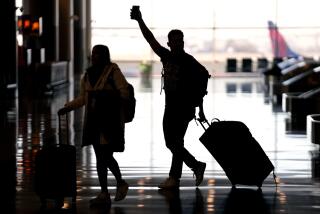For Safer Skies, More Ground Security
- Share via
There is an old adage that the traffic light doesn’t go up on the corner until someone is killed. We have a potential tragedy waiting to happen at our airports.
Despite denials and stonewalling by the Federal Aviation Administration, it is increasingly clear that security at American airports is woefully inadequate. A 1996 FAA report of violations by just one major U.S. airline--released recently, two years after a Freedom of Information request by the New York Times--indicated that undercover agents had smuggled guns, hand grenades and even bombs through scanning machines and past airline security guards. In releasing the information, an FAA administrator pointed out that airlines pass most of the 10,000 tests conducted by the agency each year but said that violations similar to those summarized in the report still occur.
Here in Los Angeles, LAX was closed as recently as last year because individuals with weapons entered into passenger terminals undetected.
Our airports are increasingly viewed as likely targets for highly visible, politically inspired violence. Yet, despite shocking revelations and expert testimony and even contrary to common sense, too little progress has been made to improve airport security in the United States.
After the crash of TWA Flight 800 in the summer of 1996, a blue-ribbon panel was established by the White House to accelerate improvement of the nation’s air traffic control system and aviation security. Little has been accomplished since its report was issued in February 1997.
The just-released FAA reports reveal that dangerous airline violations of established security procedures are being punished by modest fines and secret “slaps on the wrist.” The government justifies concealing results from the public ostensibly to prevent giving away information that might help terrorists.
It should not take years for the federal government to implement an action plan to make airports and aviation safer.
First, airports must change their baggage screening process. Sophisticated machines exist that can detect explosives. But so far, such machines are utilized only on an experimental basis in a handful of airports around the world. The FAA has been derelict in not compelling airport authorities to buy more and better detection equipment.
Also, airports need better trained security personnel. Most security workers currently are paid minimum wage. It should be no surprise that the turnover rate is as high as 500% a year.
Elsewhere around the world, military personnel carry out airport security at international airports. This should be done in the U.S. as well. The federal government must act immediately to recruit, train and equip a special law enforcement entity, perhaps even a special branch of the armed forces, to oversee and manage airport security nationwide.
In addition, security experts advise that our major airports need more secure perimeter fencing to prevent terrorists from gaining access to runways and planes. This function also should be the responsibility of the special military entity created to handle aviation security matters.
For years, the airlines have stymied most efforts to increase airport security, citing the high cost of additional security measures and the inconvenience to passengers. One solution would be to charge a modest user fee to pay for new equipment and improved training and other procedures. Few passengers would complain if they were asked to pay a few more dollars on each ticket to provide additional protection for themselves and their loved ones.
We live in a dangerous age when acts of terrorism threaten our sense of comfort and security in public places. Airports are highly visible and, therefore, vulnerable. We should not have to wait for a major tragedy to occur before appropriate measures are taken to protect both people and property.
More to Read
Sign up for Essential California
The most important California stories and recommendations in your inbox every morning.
You may occasionally receive promotional content from the Los Angeles Times.












